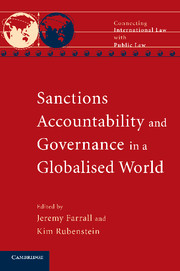Book contents
- Frontmatter
- Contents
- Contributors
- Series editors' preface
- Editors' preface
- Introduction: Filling or falling between the cracks? Law's potential
- PART I Setting down the foundations
- PART II Internationalising public law
- PART III Implementing Security Council sanctions
- 7 ‘A delicate business’: Did AWB's kickbacks to Iraq under the United Nations Oil-For-Food Programme constitute a violation of Australia's international obligations?
- 8 Should the United Nations Security Council leave it to the experts? The governance and accountability of UN sanctions monitoring
- PART IV The place of corporations
- PART V The role of lawyers
- PART VI Public law and public policy
- PART VII Parallel case studies
- Concluding remarks
- Bibliography
- Index
7 - ‘A delicate business’: Did AWB's kickbacks to Iraq under the United Nations Oil-For-Food Programme constitute a violation of Australia's international obligations?
Published online by Cambridge University Press: 05 October 2010
- Frontmatter
- Contents
- Contributors
- Series editors' preface
- Editors' preface
- Introduction: Filling or falling between the cracks? Law's potential
- PART I Setting down the foundations
- PART II Internationalising public law
- PART III Implementing Security Council sanctions
- 7 ‘A delicate business’: Did AWB's kickbacks to Iraq under the United Nations Oil-For-Food Programme constitute a violation of Australia's international obligations?
- 8 Should the United Nations Security Council leave it to the experts? The governance and accountability of UN sanctions monitoring
- PART IV The place of corporations
- PART V The role of lawyers
- PART VI Public law and public policy
- PART VII Parallel case studies
- Concluding remarks
- Bibliography
- Index
Summary
Introduction
The object of this chapter is to show that Australia did not violate its international legal obligations as a result of the kickbacks by AWB to the former Iraqi regime under the United Nations Oil-for-Food Programme (OFFP), but that the AWB scandal showed systemic failures in effective domestic governance and the appropriate conduct of Australia's foreign policy, compounded by a failure of accountability when the AWB scandal was exposed.
The chapter will examine the relevant norms of the Charter of the United Nations and customary international law, and Australia's conformity with them in its implementation of the OFFP, as follows:
Australia's treaty obligations under the Charter to implement Security Council sanctions resolutions only require the implementation in Australian law of the measures in the relevant resolutions, rather than an imaginary standard of vigorous enforcement. The report resulting from the Inquiry into certain Australian companies in relation to the UN Oil for Food Programme (the Cole Report) confirmed that Australian regulations implementing the Security Council Iraq sanctions regime covered the subsequent modification of the sanctions by the setting up of the OFFP.
The relevant customary international law standard by which any alleged violation of Australia's obligations should be judged is want of due diligence. This standard can only be defined by state practice in relation to the relevant obligations. The relevant standard of due diligence was met by Australia in respect of the OFFP: the Cole Report acknowledges that ‘DFAT [the Australian Department of Foreign Affairs and Trade] had been astute to give proper advice, when asked [by AWB], regarding the operation of the UN sanctions and the Oil-for-Food Programme.’
[…]
- Type
- Chapter
- Information
- Sanctions, Accountability and Governance in a Globalised World , pp. 171 - 190Publisher: Cambridge University PressPrint publication year: 2009
- 1
- Cited by

